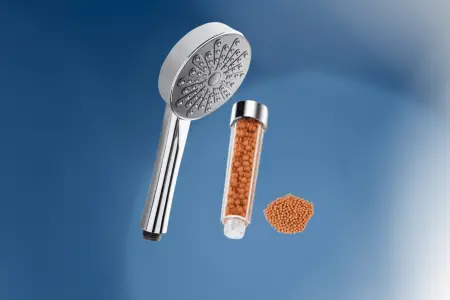Water softener shower heads may not work as intended. The water softening process involves replacing the calcium and magnesium ions in water with sodium and potassium ions. This process takes time. However, since there isn’t enough time for the water to be softened as it comes out of your shower, water softener shower heads can’t soften hard water.
To fully soften hard water, you need to pass it through a large tank of brine solution. This solution may soften water at first, but it would require constant regeneration to flush the captured minerals and prepare for the following water softening session. That is something that can’t be achieved inside a water softener shower head.
All in all, a water softener shower head might not be the best option to treat hard water in your pipes. In this article, we will reveal various options that could actually soften shower water. We’ll also discuss the various benefits of showering with soft water. Read on if you hate dealing with dry skin and brittle hair after taking a shower.
How Does A Water Softener Work?
A water softener works by removing calcium, magnesium and other minerals from water. It achieves this objective by passing the hard water through its mineral or water softening tank. The tank contains beads filled with positively charged sodium ions.
As hard water passes through the mineral tank, its positively charged ions are captured by the sodium-filled beads, with sodium ions replacing calcium and magnesium ions. As a result, once hard water leaves the mineral tank, it contains traces of sodium ions.
To replenish the sodium ions lost during the water softening process, water softeners rely on a brine solution. This is a solution of sodium chloride or salt. As for the captured calcium and magnesium ions, the water softener flushes them through the drain.
Here’s how a water softening process looks like:
- Hard water enters the water softener’s mineral tank
- Hard water’s calcium and magnesium ions cling to sodium-rich beads
- Sodium ions are released into the hard water
- Brine solution enters the mineral tank to regenerate sodium
- Sodium ions replace calcium and magnesium ions
- Water softener flushes calcium and magnesium ions
- Mineral tank is washed by the brine solution
- The brine solution is refilled.
- Repeat
As you might have guessed by now, the water softening process is too complicated (and too time-consuming) for a water softener shower head to do it properly. Although some people swear by Shower Envy shower heads.
You’d be better served to try these options to soften your shower water.
How Can I Soften My Shower Water?
Having explained why water softener shower heads might not be the best option to get soft water, let’s turn our attention to the water filtering options that would ensure that you shower with soft water.
1) Reverse Osmosis Filtration Systems
Reverse osmosis filtration systems have a simple working principle. They pass water molecules through a membrane that doesn’t let anything but water molecules through. This means that they filter impurities based on their size and shape.
Reverse osmosis systems not only remove hardness-causing minerals from water. You can also count on them to remove chromium and lead. The US Center for Disease Control states that RO systems may also reduce arsenic, fluoride, nitrate and various other chemical contaminants.
Pros
- Efficient at softening hard water
- Remove chromium and lead
- Reduce arsenic, fluoride and other chemical contaminants
- Are low maintenance
Cons
- Waste a lot of water (1 gallon/5 gallons treated)
- Can’t distinguish between healthy and unhealthy minerals
2) Magnetic Water Softener
Magnetic water softeners use the electromagnetic field to separate calcium and magnesium (aka the hardness-causing ions) from water. These water softeners alter the structure of hardness-causing ions, reducing their ability to leave deposits on surfaces.
- The very latest hydro-magnetic technology for water treatment. No salt...
- Larger Extra heavy Ultra-Powerful Neodymium Magnets more power for $30 than...
- Installs in minutes Without tools-Anyone can install. No plumber or...
- Reduces minerals, calcium, lime scale in water causing hard water spots.
- USA made solid steel versus China-made plastic polymer encased competition.
Keep in mind that there are still question marks about the effectiveness of magnetic water softeners. For every user that claims their water’s hardness levels nosedived after using these water softeners, there is another that doubts their efficacy.
Pros
- Do not waste water
- More compact than RO systems
- Have a long shelf-life (up to 40 years)
Cons
- Efficiency and efficacy is still in doubt
3) Ion Exchange Water Softener
Whole house ion exchange water softeners replace calcium and magnesium ions with sodium ions. They contain a micro porous resin, usually polystyrene beads. The resin is supersaturated with sodium. As hard water crosses the resin, its hardness-causing ions attach to the beads, reducing its hardness.
Once they have treated a large volume of hard water, ion exchange water softeners require regeneration of the resin beads. That is where the brine solution comes into play. The brine solution refills the quantity of sodium ions, preparing the beads for the upcoming softening cycles.
Pros
- Effectively reduce water’s hardness
- Is environmentally friendly
- Can handle high flow of hard water
- Has low maintenance cost
Cons
- Relatively high upfront cost
See this article to learn more about ionic shower heads and if they work.
Benefits of Showering with Soft Water
Here’s why you might want to shower with soft water:
- Reduces the risk of hair loss. Hard water leaves a film on your hair that makes it difficult for moisture to penetrate. Consequently, the dry hair are left prone to breakage and, over time, could lead to hair loss.
- Prevents dry skin. Did you know that showering with hard water can lead to dry skin? Its minerals can change your skin’s pH balance, forcing it to lower its guard against harmful bacteria. Those of you with eczema might be especially vulnerable.
- Your soap will lather better. One of the major drawbacks of showering with hard water is that it hurts the ability of your soap to lather, thereby forcing some of its deposits to stay on the skin even after you’ve bathed, giving way to dry and itchy skin.
Frequently Asked Questions
How a water softener shower head works?
Water softener shower heads work on the principle of ion exchange. They exchange the hardness-causing minerals (calcium and magnesium) with sodium chloride (salt). This results in the reduction of water’s hardness.
Keep in mind that this is the working principle of water softener shower heads – it doesn’t in any way suggest that a water softener shower head can effectively reduce water’s hardness.
How long do water softener shower heads last?
A good water softener shower head could last for years, although their cartridge might require replacement every three to six months, depending on use.
Conclusion
If you suspect that you’re showering with hard water, and want to do something about it, don’t count on a water softener shower head. Instead, a reverse osmosis filtration system, magnetic water softener or whole-house water softener might be better bets.

I graduated with a degree in Chemical Engineering and have written for a number of nationally recognized publications in the home improvement space. My skills include fluid mechanics and process engineering and I have worked on numerous projects, including in waste water flow rate calculation and heat balance of steam rollers in the paper industry. My goal as a technical writer is to make complicated topics easy to understand for the average person.

